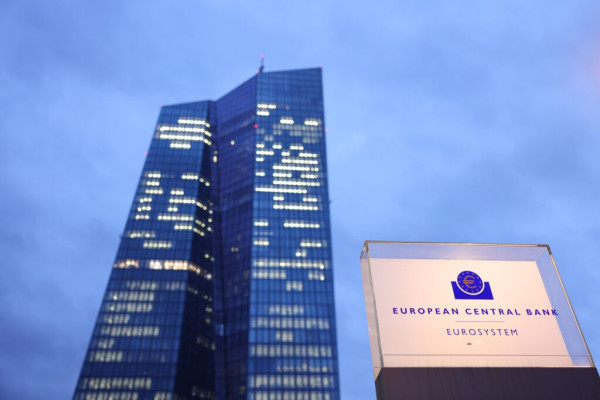Europe’s banks retreat from Moscow, with the ECB at their heels
Europe's banks' retreat from Moscow is entering its final stage, but instead of having General Winter at their heels, they have the European Central Bank.
The ECB is tightening the screws on the last significant banking presences in Russia. It's one element of a multi-faceted, if unevenly applied, strategy of withdrawing western capital and western expertise from an economy that has been mobilized to support the biggest act of aggression on the continent in 80 years.
Last week, Austria's Raiffeisen Bank International, by far the largest European bank still operating in Russia, said it expects to receive a binding requirement from the ECB to accelerate the reduction of its business there, while Reuters reported that Italian-based Unicredit was bracing for a similar letter. Both banks declined to comment for this article.
According to the ECB stipulation, Raiffeisen will, by 2026, have to reduce its balance sheet by 65 percent from its level at the end of the third quarter of last year. That was already down by half from where it was on the day Vladimir Putin launched his army against Kyiv.
In a similar vein, Italy's Unicredit has reduced its exposure to Russia by 90 percent already since the invasion. And Dutch-based ING, whose local corporate banking unit had flourished as it accompanied industrials such as Heineken and Shell into the former Soviet Union, has likewise cut its cross-border exposure by over 80 percent to only €1.3 billion as of February.
Forcing what are essentially corporate banking operations to downsize will make it harder for European industry to carry on any kind of work in Russia. But the impact on Raiffeisen, with nearly 10,000 employees across a retail network of over 120 branches, is of a different order of magnitude altogether.
The new timeline threatens its plans to salvage anything from what was for years the biggest and most respected foreign-owned retail bank in the country, an operation that at times generated over half of the group's profits.
Raiffeisen has attempted to exit by swapping the equity in its local subsidiary for a holding in construction company Strabag, which is based in Austria and focuses on central and eastern Europe. However, the deal has been held up. The stake used to be held by metals tycoon Oleg Deripaska. However, it was transferred late last year to a new holding company, whose ultimate beneficiaries are unclear. As such, it's hard to verify that the deal wouldn't benefit someone currently under western sanctions.
The ECB's order means that, by the time such issues are cleared up, there may be little left to sell. Meanwhile Strabag, like any European company where Russians had accumulated an interest legally before the war, remains indefinitely hobbled by the uncertainty.
But the slowness of the sale process had frustrated regulators on both sides of the Atlantic. Earlier this year, Acting Assistant Treasury Secretary Anna Morris, responsible for sanctions enforcement, had warned Raiffeisen that it risked exposing itself to new sanctions powers that the Office for Foreign Asset Control had been given at the end of last year, in order to squeeze Russia harder.
Raiffeisen's fate contrasts sharply with that of Société Générale, which within four months of the invasion had agreed to sell its local operation, Rosbank, to the Interros holding company of another metals tycoon, Vladimir Potanin. That deal was smoothed by the fact that SocGen and Potanin had jointly run Rosbank for years before 2022, whereas Raiffeisen had built its business up from scratch. And in contrast to Deripaska, Potanin was not on the sanctions list at the time — although both and Rosbank have joined it since.
ECB action 'didn't come out of nowhere'
The ECB declined to comment for this article, but Claudia Buch, who took over as chair of its Supervisory Board at the start of the year, said in March: “For the banks that are still there ... we’ve also given them clear expectations on how we expect a downsizing of activities and exit strategies.”

In the months that followed Russia's invasion in February 2022, the ECB had said little in public about what it expected from the banks operating there, beyond Andrea Enria (Buch's predecessor) saying that reducing exposure was “the right thing to do.” The broader impact of the war on the European economy, and consequently on its banks, was a much more immediate concern for Enria at the time.
Letters to MEPs as far back as June last year suggest that the supervisor had already indicated it expected the banks to downsize in Russia sharply, warning of “reputational risks” for those who continued. Peterson Institute fellow Nicolas Véron noted the move reflects the fact that just staying in Russia in any shape now “represents a threat to a bank's franchise and the integrity of its management.”
A person close to the process confirmed that the ECB's latest move “hadn't come out of nowhere.”
He added the ECB's move appeared unrelated to the broader horse-trading going on between the U.S. and EU over how best to support Ukraine.
At a meeting of G7 finance ministers and central banks in Washington last week, the European contingent had to push back strongly against suggestions that frozen Russian assets in Europe could be confiscated to help finance Kyiv's war effort. The House of Representatives unlocked a $60 billion aid package for the country within three days of that meeting, having sat on the bill for months beforehand.
“The ECB just wants the topic to be over,” the person said.